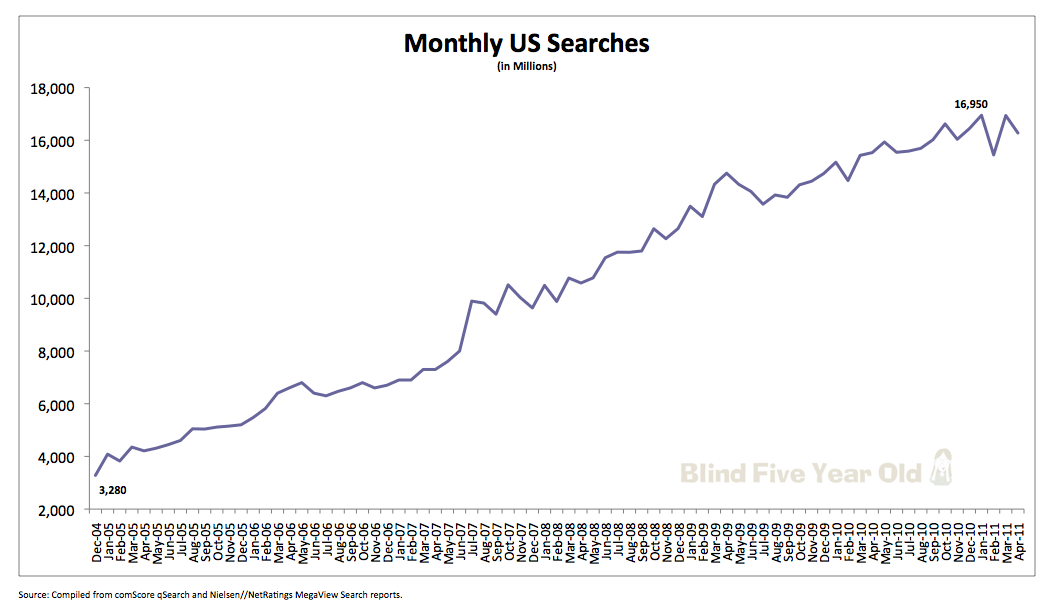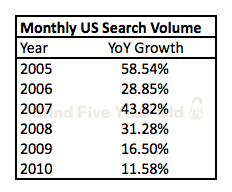This is not a ‘SEO is Dead’ post. Let me make that clear from the beginning. But SEO is going to get tougher, not because of the Panda update or anything else Google may implement but because search volume growth is decelerating.
SEO Drafting
The SEO industry has had the wind at its back as search volume soared month after month and year after year. Some might say it was pretty tough not to fall into success.
That’s not to say there wasn’t a lot of good SEO going on. But if you were posting 25% yearly SEO growth were you really being effective? Shouldn’t SEO growth be normalized based on search volume trends?
Search Volume Trends

This graph measures explicit monthly US searches from December of 2004 to April 2011 using a mix of comScore qSearch and Nielsen//NetRatings MegaView Search reports. In that time the number of monthly searches has risen from 3.3 billion to 16.9 billion.
Search Volume Growth
To some the trend might look rosy. But look closer. Using December search volume as a benchmark, the year over year (YoY) growth in search volume is decelerating.

The YoY growth in 2011 could be in the single digits. Of course you could drill down into specific category (even keyword) search growth, but I believe this is a macro level trend based on demographics.
Search Adoption
When I debated the definition of search quality, I mapped out daily search usage against the innovation curve. In May of 2010 79% of American adults were online and 87% used a search engine to find information.
If you do the math you find that approximately 165 million American adults or 69% of the total adult population now use search.

That puts us a little more than half way through the Late Majority, and that was a full year ago.
SEO Shakeout
Recently the SEO industry has grappled with the idea of standards or certifications and differed on ‘outing’ SEO companies who violate search engine guidelines. The industry is maturing, but I wonder if we’re missing the bigger picture.
That gale force tailwind we once had is now a gentle breeze. Decelerating search volume growth will squeeze mediocre SEO out of our industry.
It will push us all to up our game, to evolve and specialize. The free ride is nearly over, it’s time to put up or shut up.
The Next Post: Yahoo Email Hacked
The Previous Post: Translating Panda Questions

2 trackbacks/pingbacks
Comments About SEO Freeloaders
// 6 comments so far.
Rick // May 12th 2011
What people seem to fail to realize (not you necessarily:) is that during this time there has been a major daily influx of new sites competing for the same search resources.
Law of supply and demand, we have an oversupply of results, a squeeze from local search results displaying Google Places and a dwindling demand (searches).
Yes, there will be pain.
aj // May 13th 2011
Rick,
That’s true, it would be interesting to track the number of sites during this time frame as well. There are a lot of sites out there now and the oil from those
fieldsSERPs is about to run dry.Alan Bleiweiss // May 13th 2011
This is great insight. It’s going to lead to many who currently claim they offer SEO to have no ability to sustain long term. They’ll have three choices – get out of SEO, actually ramp up knowledge, or opt to find the “easy” path by learning to game the results system.
The next couple years should prove quite interesting indeed.
aj // May 13th 2011
Thanks Alan.
I hope it forces those who ‘claim’ to offer SEO to move on to something else. Moving the needle will become more difficult in the next couple of years. Unfortunately, that may push many to resort to more gray and black hat tactics. I anticipate a bumpy ride, but believe the industry will finally emerge stronger as a result.
Rick // May 13th 2011
AJ-
Here’s the example I tweeted to you earlier: http://bit.ly/lnorzm
The site is conspicuously like about 10,000+ other tech sites covering the latest and greatest gadgets. Even if the content is 100% original, is there a value add to have the site in the index? Sounds harsh but when I put my “blind five year old” glasses on, this site looks like hundreds of others and the algo probably thinks so too.
I find it amusing that they promote the Bing angle as a better alternative only to offer a screenshot of their own site in the results as evidence. Nothing like objectivity.
At the end of the day, I can build a solid site structurally but often have little say in the content that goes on the page. That content now weighs more heavily than ever. It’s disconcerting to know that SEO success now depends heavily on parts of an organization that might mistrust our efforts.
Time to do more internal networking.
aj // May 16th 2011
Rick,
The technology and gadget space is saturated, so even if this were a well curated site, it winds up looking generic. The screenshot is hilarious, but shows that they’re probably not doing a lot of due diligence but instead are simply reporting on their own anecdotal keyword traffic findings. Oddly, if you trust Alexa’s Clickstream numbers, they rely on Google (and not Bing) for most of their search traffic.
I agree, the rising reliance on content (and user experience) makes the synergy between SEO and other parts of an organization more critical than ever. Yet, the public flogging SEO is taking from mainstream media, the Internati and other search engines creates a difficult landscape to make those connections.
Sorry, comments for this entry are closed at this time.
You can follow any responses to this entry via its RSS comments feed.